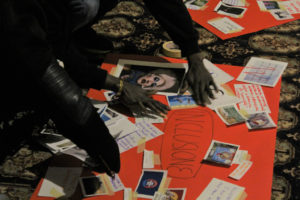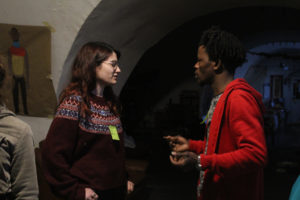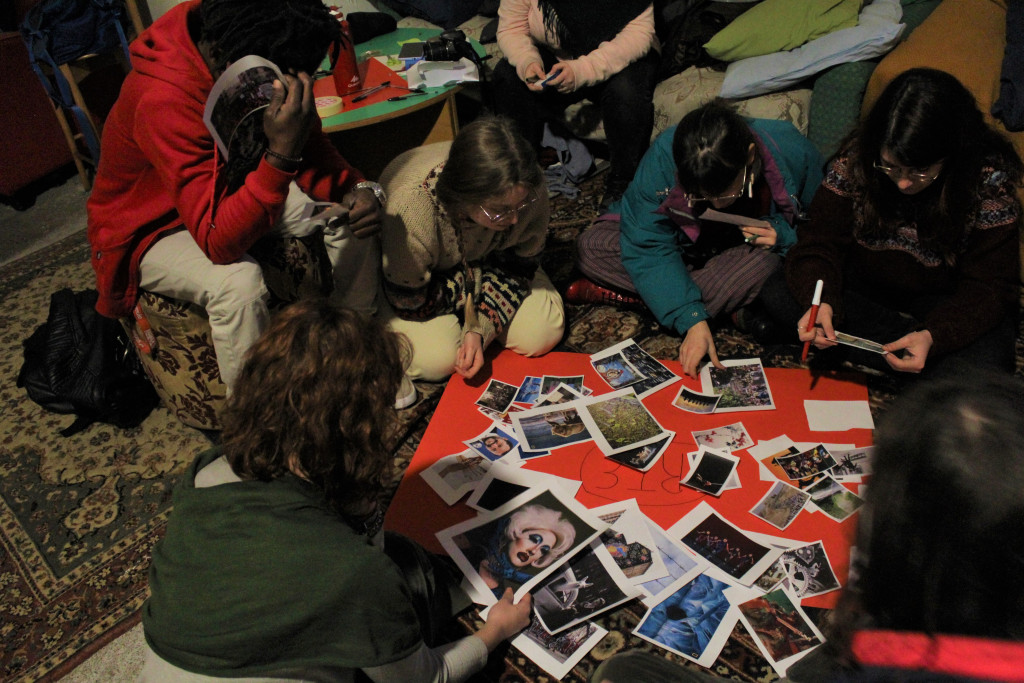The “In My Art” project started in Bologna during an Arte Migrante evening in which Bianca talked about the project and with Jenny they painted the hands of some participants with the symbol of “In My Art”. After that, that was in the beginning of January, we met in February for the Action Research Workshop in a place that is called “Il Cerchio Dalla Libia a Via Libia”, a gathering for many young immigrants that are just arrived in Bologna. The place is runned by Eta, a very generous lady that provides food and accommodation for them. Arte Migrante started in November to do an event every month there and so some of the youngster of the place already knew some of the “In My Art” participants. The workshop lasted one afternoon and after we had dinner together there. We started the workshop with a “knowing each other” game in which every participant had to discover some personal facts about the others. Then we did a creative brainstorming on “Art” and “Inclusion”, with drawings, words and images.

Regarding “Inclusion” here are some extracts of what was shared: “Inclusion is to find a home”, “Inclusion is to be/express yourself”, “Inclusion asks for attention”, “Inclusion is the art of improvisation in which no note is wrong”, “Inclusion is knowing each other, is diversity, be open to the change, needs attention, is questioning yourself”, “Inclusion is to be open to dialogue”. For Art we have: “Art expresses a culture”, “Art is what your hands can do”, “Art is about looking elsewhere from the same place”, “Art is passing time counting the hours differently”, “Art gives joy”, “Art is helpful to life”, “Art is always social”, “Art is empathy and humanity”, “Art is a universal language”, “Art has no rules”, “Art is everywhere”, “Art is a way for inclusion that unites a society”. It was a very comfortable moment in which we shared our thoughts and feelings in a safe space, with no judgement and discrimination. One of us didn’t speak very well Italian so we had to be careful to express us in a simple but clear way. After this part we discussed local organizations that work with art as a tool of inclusion, and we found that in Bologna there are some (other than Arte Migrante): Cantieri Meticci that deals with theater, Vicini D’Istanti is a social tailoring that works with immigrants, AfroBeat is a collective of musicians that involves different neighborhoods in Bologna, young and old people from all over the world. In little groups we tried to analyze what constitutes the strengths of making art with different kinds of people and creating a community that has the value of inclusion. Starting from this discussion about local organizations, finally we wrote a draft of possible questions to ask during the action-research and the interviews. We wanted to do the interviews in person but the Covid-19 changed our plans, so we had to do them on-line to our friends or family members. Some of us like Tiziana did them to the housemates. Eli said that “The interviews went pretty good, because we came near to people’s mentality to try to understand what are people needs, what they like or not about Arte Migrante for example. Trough the interviews we understood that people really wants to meet other people here in Bologna”.

For every one of us was very interesting doing the interviews especially for some that study sociology or anthropology. It was a way to practice a sort of field work. What came out was also that in Bologna lots of youngsters know Arte Migrante and other associations but they don’t always participate at these events. “That’s because Bologna is a sort of passing through place in which nobody is permanent” said Tiziana. Aurora thought was that: “Maybe most of the time the problem is the place of the gathering because if it’s too far I’m dissuaded from going, but also if I don’t know nobody there maybe I don’t feel like going”. All together we suggested that the people that organize events for sharing personal stories and art should focus on making new participants feel at ease, and explain in a simple but clear way what they are doing and what the aim of the event is. Mamadi asserted the importance for young immigrants to feel included in the community of the city they live in, and he considers art to be the best way, because it goes beyond language. He suggested that maybe the city could offer more events with a mix of Italian and African dances and music, open to everybody so that people can meet. He also mentioned the fact that many of his friends don’t speak Italian very well and this makes it difficult for them to be aware of events but also other facilities that the city offers. The city and its organizations should work to provide more dialogue and information not only in Italian. Eli concluded: “In this project you can find the world in a room” and that when you go to Arte Migrante: “You can feel that is a valuable thing and that people feel at home”.

